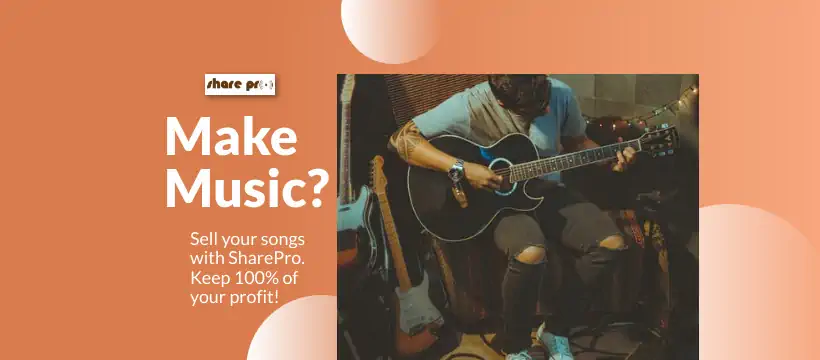How to Deal With Criticism as a Songwriter
There are many ways to deal with useful or hater criticsm, we show you how.
You’ve been working hard at sharing your music with the world, aiming to communicate to listeners every sound, melody, and message that has been dancing around in your head in the most resonant way possible.
In today’s connected world, you’re bound to receive a tonne of opinions about your songwriting.
But what if the comments come as a shock and its criticism? You were not expecting it, so how are you supposed to deal with criticism as a songwriter?
Your ears may perk up to latch on to every word, but it’s key to make some sense of the criticism about your songwriting to decide on what to tune in or out of - whether it comes from the music industry, labels, and A&R, audiences, other musicians, or your close social circle.
Understand why you’re receiving criticism
First of all, you want to weigh up whether you should be paying any attention to the criticism. To figure out if your songwriting needs to undergo some changes, first ask yourself why you’re receiving the criticism.
Did You Ask For Opinions and Advice?
Well, there’s your answer.
If you asked your friends and family for their thoughts and opinions about your music, your close social circle could get carried away, and in the spirit of intending constructive criticism, you could find yourself faced with a host of criticism.
You want to dive deep down into the source of why you asked for their opinion in the first place even though you know they have absolutely no experience or technical know-how to form an informed opinion.
Are you perhaps insecure and nervous about sharing your music beyond your social circle? Are you self-sabotaging your form of artistic self-expression by trying to please everyone, even your uninformed friends and family?
If you have a habit of blocking yourself from moving beyond your social circle’s criticisms, then frequently remind yourself to be aware of your habit of self-sabotage and congratulate yourself for each day of moving past your people-pleasing ways. Be proud of sharing your art with the world. It’s part of human nature. Own it.
Push Through The Haters
What if you didn’t ask for anyone’s opinion and you come across criticism of your music? If it comes out of the blue and you're faced with a hater, it could come as a shock.
Now, if a hater is going out of their way to ensure you hear their criticism, just let them go right ahead and waste their time. Don’t waste yours.
Try to form an understanding of why your music is being criticized and think things through logically. Let reason take the steering wheel, rather than emotions hijack the ride.
Preserve Your Energy
It can be extremely challenging to hear criticism about our songwriting from our closest and dearest. Perhaps they’re a friend or partner whom you care deeply about and wish to please. It can take just a single facial expression or comment that can really hurt.
Ouch.
First of all, while finding people who resonate with your songwriting is deeply rewarding, remember that it’s just a bonus and should not define the validity of your music. The aim should never be to please anyone but yourself.
Secondly, you want to take a good look at the quality of your closest relationships. If they cannot understand the respect involved in the concept of keeping impolite comments to themselves and are completely ignorant of any musical and technical knowledge, then you might want to rethink your relationships.
Conserve your energy and surround yourself with people who both challenge and support you instead.

Learning how to deal with criticsm is important for improving your music. However, always consider the source of the criticism.
Stay True To Yourself
Now, if you happen to be in the position of receiving criticism from fans and listeners, then you must orientate your focus.
Ensure that the compass guiding your journey is your true authentic self - because having built up your fanbase in the first place means that you are already doing something right!
It’s fantastic that a conversation around your songwriting by listeners and fans has formed. Savor the range of strong reactions that your work triggers.
But that doesn’t mean you have to join in on the conversation.
Just as when dealing with criticism from close loved ones, fan opinions may be crucial to you. But if your new release is moving in a different musical direction and some audiences aren’t on board, remember that not everyone will have the same songwriting capability as you and your team.
Most importantly, you must still create music that’s close to your heart and authentically transmits your artistic expressions.
Know Who's Opinion You’re Asking
The music industry is known as a people’s business, and songwriters have to deal with a host of team members in the industry, ranging from labels to producers, managers, A&R, supervisors, and the press. Collaborating with a whole team of music enthusiasts in the industry can make your release campaign an unimaginably fulfilling experience.
However, when you’re striking up a collaboration with someone in the industry, ask yourself what their experiences are. There are tons of people out there trying to make money off of unbeknownst artists and won’t hesitate to fabricate or exaggerate their experiences.
A quick way to inspect a prospective collaborator’s experience levels is to reach out to other artists that they’ve worked with and ask about their experiences.
Check out label rosters and you’ll be able to see how versed they are in your style of music.
This will help see if the collaboration will be comfortable and beneficial for both of you. You want someone to provide guidance in a supportive way.
Asking For Trouble
The music industry is ever-evolving, racing to catch up with changes in marketing and public relations.
Music journalists, blogs, radios, newspapers, and magazines are bombarded daily by thousands of artists all over the globe filling their email inboxes with requests for music reviews, radio spins, playlist streams, features, and interviews.
Over the years, some media curators have tried dealing with the sheer volume of requests by creating platforms such as SharePro, allowing artists to pay the media to respond to PR requests for as little as a single dollar.
This quickly got out of hand, leading to many - but not all - media platforms providing as much feedback as possible to gain as much as they could while accepting as few pitches as possible.
Some of the feedback on these platforms has been so shocking, it’s hilarious.
Nevertheless, countless songwriters hope to receive positive reviews for their latest releases.
It's important to realize the architecture and structure of how criticism is provided in the music media landscape. In fact, putting yourself in the journalist’s shoes can help artists better formulate their PR pitches. Empathy and compassion are key!
Be Open to Learning
If you're sharing your new demos with your label or an A&R manager and your latest creations are met with criticism, embrace the criticism with curiosity.
Ensure that your team is on board with supporting your art and lifting you up, and have this in mind when they provide their guidance and express their criticisms within an environment of mutual respect.
If a meeting with your team has you doubting your music and art, remember the reasons why you began and create daily rituals that are focused on lifting your mood and drive to help you understand your team’s support for you.
Now, that’s not to say that there isn’t room for learning - if you’ve found your dream producer or are blessed enough to find a seasoned mentor in the industry and they’re suggesting brushing up on your singing lessons or production lessons, there’s always so much to learn. Tightening up the technical side of things could save valuable recording time in the studio or make songwriting sessions much more fluid.
Conclusion
As a songwriter, it can be hard to separate yourself from your art, but it’s important to understand that any criticism about your songwriting is not a criticism of you as a person - no matter how much you feel that your songs express you.
Criticism about your songwriting can leave artists feeling down. It could get you down, it could change your perception, but it could also be exactly what you need.
Blog Article Tags
songwriting music creators indie criticismMore Articles
When writing a song what comes first music or lyrics? - Learn how to write songs with or without music & learn what's the best method for you.
How To Make It In Music Living Outside The USA - If you live outside the USA there's many ways for you to be successful in music.
The Best DJs and Producers of Nigerian Music - Explore today's most influential players in Nigeria’s vibrant music culture.
7 Singers Whose Music Careers Ended Too Soon - From early retirements to unexpected tragedies, these singers have left us all wanting more.
7 Heartbreak Indie Songs Worth A Listen - Breakups got you feeling down? Let your indie-listening spirit enjoy our playlist.



